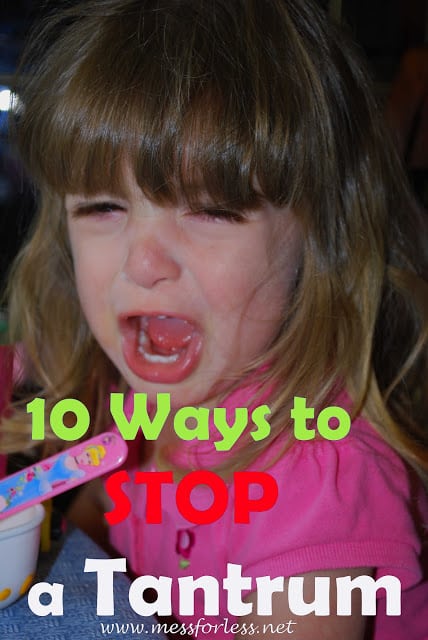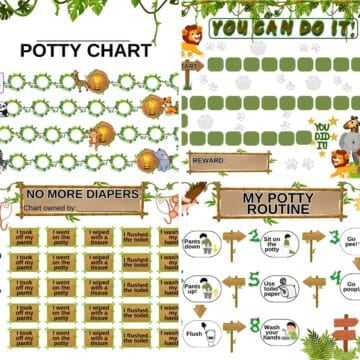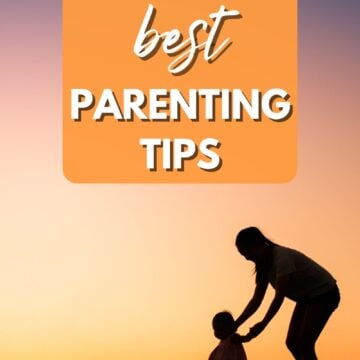Are you looking for parenting tips to help you raise your toddler? Here are 10 Ways to Stop a Tantrum that I have found effective. What are tantrums? Merriam-Webster defines tantrum as a "fit of bad temper". All children have them. I know plenty of adults who have a "fit of bad temper" as well on occasion.
When you come to Mess For Less and get ideas for kids crafts and activities, you will see lots of photos of my happy and engaged children. If you don't know us personally, you might think things are always like that at my house. That is far from the truth.

We deal with our fair share of meltdowns and temper tantrums. If you have a child of any age then chances are you have dealt with a tantrum or two as well. My kids are prone to them and some days are worse than others. You might also find How to Prepare a Toddler for a New Baby helpful.
If you would like to purchase books that have helped me stop a tantrum, there is a list at the end of this post.
Ways to Stop a Tantrum
From a child's perspective, what are temper tantrums good for? Clearly, tantrums allow children to express their frustrations, but they are also a way for children to get attention. With that in mind, here are some tips and techniques we have used (in no particular order) to help stop a tantrum and restore calm to the household. You will notice many of them involve diverting a child's attention.
1. Distraction
This is a pretty easy one to employ and it works great for those times a child is upset because you won't give them something they want. "I have to tell you/show you something!" I'll say in a very excited voice. Often, that's enough to stop the tears and pique their interest.
2. Counting
We used to think my daughter B could not control her temper and outbursts. I would often think "poor kid, she can't help it." When she would be having a fit about something (she didn't get the color cup she wanted at lunch) we started counting to three and told her that if we got to three, she would go to time out. She did not want to go to time out and so she would stop crying. It would be pretty funny to see this kid going from full blown fit to quiet. It looks like maybe she could control her outbursts after all. Hmmmm...
3. Removing an item or privilege
In the midst of a meltdown, we say that we are going to take away something the child enjoys unless they can calm down. For example, "If you don't calm down and stop yelling then we will not go to the park later." Often the fear of losing something enjoyable can get kids back on track.
4. Deep breathing
Sometimes my daughters get so worked up about something that they forget to breathe and need to be reminded to do so. During calmer times, I have taught my kids how to take deep breaths and we will often do them together during a tantrum. This usually helps stop the crying and screaming on the part of the child, and truth be told, helps the parent calm down as well.
5. Tight Hugs
This goes hand in hand with the deep breathing. I find that a tight hug makes my child feel safe and they will often collapse into me since they are exhausted from the tantrum.
6. Quiet Spot
When one of my daughters was having frequent and severe tantrums, we established a "quiet spot" for her. We used a pack and play with pillows and a stuffed animal in it. Another option is a cozy corner in another room away from the action. Some pillows and stuffed animals help to diffuse the situation. We would let my daughter tell us when she was ready to come out. Sometimes when she sensed herself becoming upset, she would ask to go to her quiet spot.
7. Music
You can incorporate this with the quiet spot or use it alone. Give the child some headphones to listen to some calming music or children's songs. While a child is having a tantrum it is difficult for them to stop it and break out of their mood. The music automatically changes the mood and the headphones shut out the outside environment.
8. Using quiet voices
I find that if I am raising my voice or yelling in attempt to get the tantrum to stop, it only escalates things. It seems totally unnatural when you have a screaming and crying child to speak in a quiet voice, but it does help by not adding fuel to the fire.
9. Talk it out
This works better with older children. I use this one with my twins who are almost 4. Sometimes the fit will start so suddenly that I have no idea what caused it. When that happens, I will take the child to another room, sit them on my lap and ask them why they are upset. When they tell me, I ask "what can I do to make you feel better?" I think it helps them to have a say in the solution. Sometimes the answer is a kiss, other times it's an apology from a sibling.
10. Walk away
Sometimes, despite your best efforts, nothing works. I have found that occasionally the best thing to do is nothing. Walk away and ignore. This is the hardest of all the options because it's agonizing to listen to your child be so upset. When I have walked away and stopped giving attention, I have noticed that within a few minutes (2-10 or longer depending on how strong willed the child is) the child will stop and join the rest of the family.
Do these 10 ways to stop a tantrum always work to stop the whining and crying? No. If you have a technique that always works please let me know! Heck, even if you have a tantrum stopping technique that only works some of the time, let me know in the comments below. Every child is different. What works for one may not work for another. Try a few of these tips and see which your child responds to best. Good luck and remember when in the midst of a tantrum, this too shall pass.

Here are my favorite parenting books which contain great advice for dealing with tantrums:
Happiest Toddler on the Block
1,2,3 Magic
The Emotional Life of the Toddler
Setting Limits with Your Strong Willed Child
Boundaries with Kids
Don't forget to check out Part 2 - 10 MORE Ways to Stop a Tantrum with advice from our readers!
*No child was harmed in the writing of this post. The photo above of my youngest was taken when she was told that she could not have a third refill of juice.
If you enjoy reading about how to stop a tantrum you'll love:
10 Tips for Surviving the Terrible Twos





Katy says
This tips are good worked so well with my first son. Now he is 5 and he does not throw tantrums anymore. If he is sad or upset he will just come and tell me and we will find a solution together. Now my 14 months old son is the one nothing in the tips helped. He gets mad for anything and what make it worst, when he is mad he hit his head with anything around him. He hits it very hard on floor tile. Or corners of the wall. If nothing hard around him to do it he will hold into my knee or my shoulder to hit his head.I try to talk to him. Distructed him with something else. It not working. Only if I pick him up. I can't just keep holding him up. All day long I got thing to do. What should I do
Vicky says
Katy, how wonderful that your 5 year old is so in touch with his feelings that he can come and talk to you. Sorry to hear about the struggle with your younger son. Maybe find a place for him when he gets very upset that will be safe (lots of soft things, pillows). My kids start the "terrible twos" phase long before their second birthday. Here are some tips that helped with my daughter when she turned 18 months. https://www.messforless.net/10-tips-for-surviving-terrible-twos/ Hope this helps.
Nosch says
Hi there Vicky
I just posted something about Toddler Tantrums yesterday, and later came across your blog post on pinterest.
Its really nice, detailed and crisp.
I would appreciate if you can go through my post about Toddler Tantrums and give your feedback too. Thank you 🙂
http://adesimomsblog.com/toddler-tantrums-real/
Regards
Jessica says
My 4 year-old daughter has always had, and still has, crying/tantrum episodes every single day. it’s humiliating. Bedtime is so stressful EVERY DAY! And this is not the only time she is out of control.
I have tried it all; routine, stories, positive reinforcement, games, etc, etc., still, nothing works. We can't figure it out...we would appreciate your input...I'm all ears!!! Thanks!!
Jennifer says
My baby is already 6 years old, but I can remember tantrum horror like it was yesterday. I had some advice from my mother; my favorite was time-outs...sparingly. Depending on the child, using a time-out occasionally, beginning at about the age of 18 months, may help her manage feelings better when she has a tantrum. A time-out can be helpful when your child's tantrum is especially intense and other techniques aren't working.
Placing your child in a quiet, or – better yet – boring spot for a brief period (about one minute per year of his age) can be a good lesson in self-soothing.
Full Spectrum Mama says
Children with sensory processing differences and/or autism might find the quiet place most helpful: what looks like tantrums for them are really MELTDOWNS - a very different thing. Thanks for all the tips!!
Full Spectrum Mama
Erin says
As my son is getting a little bit older, I often find that it helps with his tantrums/ meltdowns to figure out what it is he needs or wants. Sometimes, it's simply because he's really hungry, and we're fine once we get something to eat. Other times, it's as simple as helping him figure out what he actually wants. Other times, who knows! But, trying to figure it out with him seems to help a lot.
Ashley says
Numbers 5, 6 and 8 are the best for my almost 5 year old autistic nephew
Vicky says
Thanks for sharing Ashley. It can be tricky to find things that work.
Rachel Margolis says
Our son has to go in his room if he's going to throw a tantrum, and he is allowed to yell and cry as much as he wants in his room to get the feelings out. Within about 5 minutes me back out, and we can sit down and find out why he was so upset. I usually try to avoid a tantrum, but when he's sleepy or hungry, sometimes, you just gotta get the angst out! We also will use a time-in when he's getting wound up ready for a tantrum. He has to find a book, and a quiet spot and read his book as slow as he can. He thinks it a game and it gives him 10 min of quiet time to calm down.
Vicky @ Mess For Less says
Thanks Rachel, I like that idea especially because it doesn't disturb other members of the household. My other kids don't want to listen to screaming and crying. Thanks for sharing!
Cherusha Davies says
have a little sister that throws fits a lot. The worst thing is that she is teaching the baby to through fits too. We have tried a lot of these and they don't seem to work with her. Except for 10 that is the one that we resort to most often but as you said it doesn't work in public. I hadn't herd of some of these. am going to try them thanks for this list it will make it a lot easier to babysit.
Vicky @ Mess For Less says
Thanks Cherusha, Hope they help!
Hilda Flores says
Thank you very much for your tips. My daughter Camila is going to the daycare and I guess she sees kids doing them anytime and now she is starting. So far im either talking yo her very quietly or giving her some space while I do other things, since she gets no attention she stops very quickly but yhe rest of them look like a good option if she continues to do so....
Wandering Madman says
try throwing your own fake tantrum(something my ex used to do). It usually shocks them into silence and shows them what they look like doing it.